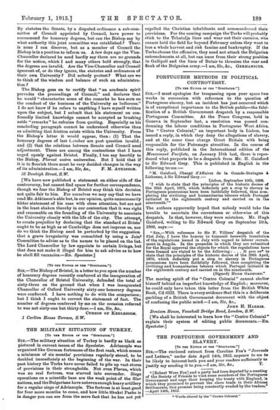PORTUGUESE METHODS IN POLITICAL CONTROVERSY.
[To THE EDITOR Or THE "SPECTATOR."]
SIR,—I must apologize for trespassing upon your space two weeks in succession with reference to the question of Portuguese slavery, but an incident has just occurred which is of exceptional importance to the British public—the falsi- fication of a British Government despatch by a responsible Portuguese Committee. At the Peace Congress, held in Geneva in September last, a resolution was passed con- demning the labour conditions in Portuguese West Africa. The " Centro Colonial," an important body in Lisbon, has issued a reply, in which they deny the allegations of slavery, and at the same time charge Great Britain with being responsible for the Putumayo atrocities. In the course of this reply, published in the International edition of the Mouvement Pacifiste, on January 15th last, there is repro- duced what purports to be a despatch from Mr. H. Gaisford to Sir Edward Grey. This is published in English in the following terms :—
"M. Gaisford, Charg6 d'Affaires de la Grande-Bretagne it Lisbonne, a Sir Edward Grey :—
Lisbon, September 10th, 1909. wish to state that the principles of the historic decree of the 26th April, 1875, which definitely put a stop to slavery in Portuguese possessions have been faithfully followed, thus com- pleting the civilizing and humanitarian labours which Portugal initiated in the eighteenth century and carried on in the nineteenth.'" The authors apparently hoped that nobody would take the trouble to ascertain the correctness or otherwise of this despatch. In that, however, they were mistaken. Mr. Hugh Gaisford, writing to Sir Edward Grey on September 10th, 1909, says :— " Sts, With reference to Sir F. Villiers' despatch of the 31st July, I have the honour to transmit herewith translation of the regulations issued in July with regard to labour recruit- ment in Angola. In the preamble in which they are submitted for the Royal approval the objects for which the regulations have been framed are stated to be the following : . . . It goes on to state that the principles of the historic decree of the 29th April, 1875, which definitely put a stop to slavery in Portuguese possessions have been faithfully followed, thus completing the civilizing and humanitarian labours which Portugal initiated in the eighteenth century and carried on in the nineteenth.
(Signed) Huai' GAISFOBD."
The moving spirit of the " Centro Colonial" cannot shelter himself behind an imperfect knowledge of English ; moreover, he could only have taken this letter from the British White Book, Cd 6322. There is every evidence that this is a deliberate garbling of a British Government document with the object of confusing the public mind.—I am, Sir, &c., JOHN H. HARRIS.
Denison House, Vauxhall Bridge Road, London, S.W.
[We shall be interested to learn how the "Centro Colonial" explain their system of editing public documents.—En. Spectator.]










































 Previous page
Previous page